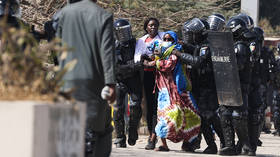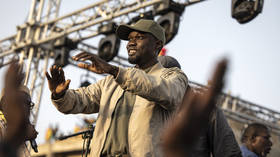Election delay heightens tensions in African state

The African Union (AU) has called on Senegalese authorities to hold a presidential election as soon as possible, citing concerns about unrest in the country following the postponement of a vote originally scheduled for later this month.
The statement from the 55-nation bloc on Sunday came a day after Senegalese President Macky Sall pushed back the West African nation’s February 25 election to an unspecified date, citing electoral issues that he claimed would trigger conflict. Sall, who is not running for office, cited a disagreement between the judiciary and federal lawmakers over the exclusion of key opposition candidates from the final electoral list, including the jailed Ousmane Sonko and Karim Wade, as well as the alleged dual nationality of some candidates already cleared to contest the vote.
Wade, the son of former Senegalese President Abdoulaye Wade, has accused judges of corruption in the disqualification process and has requested the rescheduling of the polls, in order to “make it possible to repair the damage suffered” by those disqualified.
However, Sall’s decision has sparked anger, with several of the 20 opposition candidates and civil society organizations denouncing it as an “institutional coup.” They have called on citizens to defend democracy.
“I am launching my electoral campaign tomorrow, in Dakar [the capital], with the candidates who have chosen to defend the Constitution,” former minister and opposition candidate Thierno Alassane Sall wrote on X (formerly Twitter) on Saturday, rejecting the president’s announcement.
Clashes erupted on Sunday in Dakar between the police and demonstrators protesting against the postponement of the election, which is the first such delay since Senegal gained independence from France in 1963. Police fired tear gas into the crowd and arrested numerous protesters, including former Prime Minister Aminata Toure and Anta Babacar Ngom, one of the candidates in the postponed vote, the Associated Press reported on Monday.
The former French colony has been embroiled in political tensions, resulting in deadly protests by opposition supporters. Last June, violence broke out across the country, killing over a dozen people, after Sonko, leader of the Patriots of Senegal for Work, Ethics, and Fraternity (PASTEF) party, was sentenced to two years in prison for immoral behavior toward a minor. His party has accused the government of “intimidation” and “political witch-hunting.”
Late on Sunday, AU Commission Chairperson Moussa Faki Mahamat “strongly” encouraged “all political and social forces to resolve any political dispute through consultation, understanding, and civilized dialogue, in strict compliance with the principles that govern the rule of law.”
Earlier, the West African regional bloc, ECOWAS, called for dialogue to resolve Senegal’s political crisis. The authority has urged Senegalese authorities to “expedite the various processes to set a new date for the elections” in order to protect the country’s “long-standing democracy,” in a region where coups have occurred in several states, including Burkina Faso, Mali, Niger, and Guinea.













